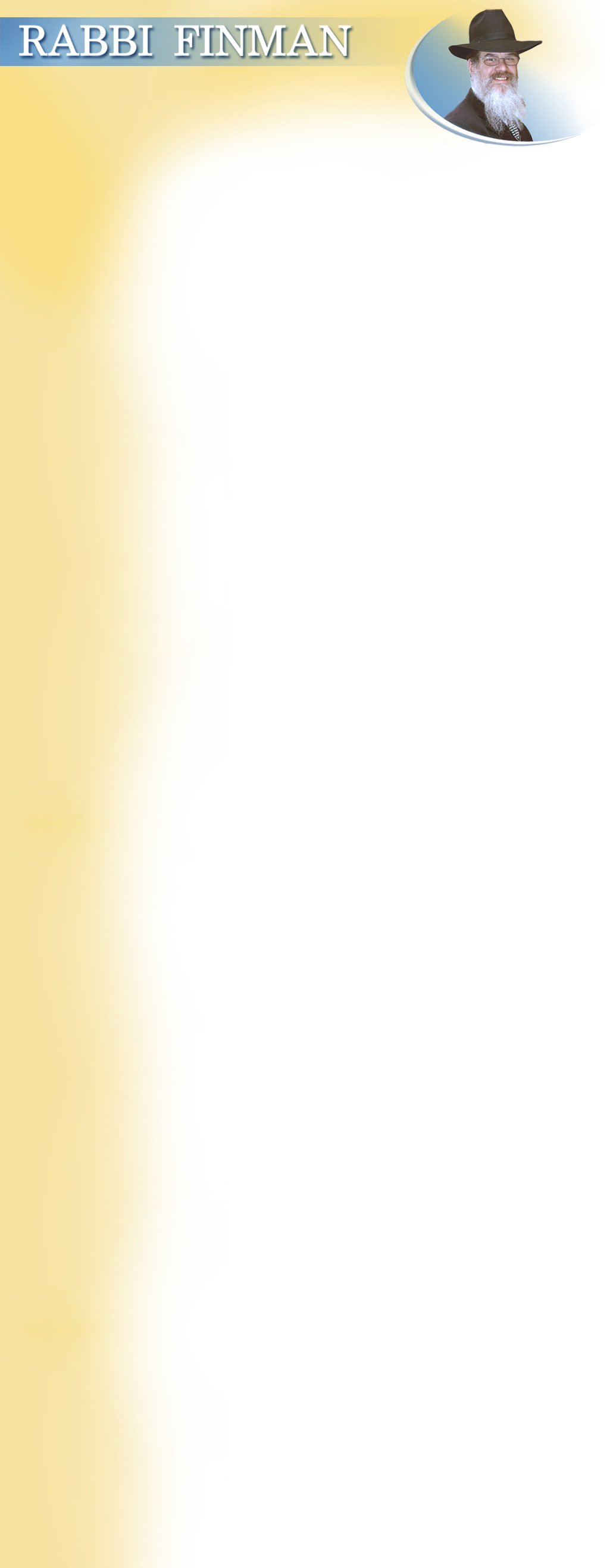








Back in 1996, Rabbi Finman was asked to speak to the niece of one of his students. After spending many hours answering her questions, the woman gave Rabbi Finman her e-mail address. Rabbi Finman wrote the woman a note and included in it a short insight into that week's Parsha and a short Chasidic story.
Realizing that this was something no one was yet doing,, Rabbi Finman sent the missive to his mailing list of about 30 people. Requests from recipients friends came pouring in. The next week Rabbi Finman sent the e-Parsha to 100 people. Within a year more than 2000 people were receiving it. Today, more than 14,000 receive the e-Parsha weekly and the requests keep coming in.
Titsaveh 5786
Terumah 5786
Mishpatim 5786
Yisro 5786
Beshalach 5786
Terumah 5786
Please click on the link below to receive the e-Parsha in the way cool HTML version right to your inbox. http://visitor.constantcontact.com/d.jsp?m=1103523647591&p=oi
YouParsha for Teruma https://www.youtube.com/watch?v=I7d1meOD60A The Tachash skins.
====================
Parshas Terumah, Exodus 25-26, describes the details of the portable sanctuary in the desert. Moshe brought down the tablets of the Ten Commandments from Sinai. They were contained in the Holy Ark, which was topped with an elaborate cover. On the top of the cover were two cheruvim - golden cherubic figures. Jews are not into statues. The commandment states clearly that you shall have no graven images before me. Yet, the Holy of Holies - the focal point of Judaism displayed such images. Hashem told Moshe that all communication would come from between the two cheruvim. So, not only were there graven images in the Temple, they also served as an iconic oracle!
The Mittler Rebbe, second Lubavitcher Rebbe, gives an example of the relationship between a teacher and a student. The teacher cannot explain the subject to the student as the teacher understands it. The teacher must limit his own intellect; abridge the concepts and put them into terms to which the student can relate and give examples. The essential concepts are conveyed in this manner. Each abridged expression maintains the core idea. Were any of the core concepts missing from the examples, the student would never be able to fully grasp the concept as the teacher understands it.
In order for Hashem to create the world, numerous containments and contractions of Divine energy had to occur. Each step limits the G'dly revelation. What Moshe received though the wings of the chevrum would best be compared to a parable of Divine radiance. Because the Torah is the will and wisdom of the Almighty, what Moshe ultimately received and passed on to the Jewish people, is the essential will and wisdom of Hashem (in user friendly form).
The Alter Rebbe in Tanya explains that when we do a mitzvah, even though it may be through an intermediary object; leather tefillin, wool tsitsits, wax Shabbos candle, etc., we are grasping onto Hashem and Hashem is hugging us. There is no difference if one hugs the king if he is wearing one garment or many, since the body of the king is in them. Likewise, when one learns Torah, they unite their will and wisdom with the will and wisdom of Hashem in a perfect unity; one which has no parallel in this world.
====================
This story happened in the early 1770's. A local merchant would regularly visit Reb Zusha of Annipoli. In exchange for his advice, the man would give his Rebbe a small sum of money (which Reb Zusha desperately needed). On one such visit, he was informed that Reb Zusha went to visit his Rebbe - Reb Dovber, the Magid of Mezritch. The man thought, "My Rebbe has a Rebbe? I will go visit him." From then on, the man stopped going to Annipoli and started going to Mezritch. Shortly thereafter, the man's business started to fail. He requested a private audience with the Magid.
Hearing the man's plight the Magid explained to him, "When you weren't particular as to which Rebbe you went, the Almighty wasn't so particular with you. When you decided that Reb Zusha wasn't good enough, the Almighty decided that your service to Hashem wasn't good enough. I suggest you go back to Reb Zusha and continue supporting him."
=========================
Listen Weekly to the Jewish Hour Podcast. www.rabbifinman.com. Now available on iTunes, spotify, audacy, and wherever you park your podcasts.
The Torah e-Parsha is a project of Jewish Ferndale. For information on sponsoring the Torah e-Parsha in memory or for the recovery of a loved one, in honor of a simcha or you just feel like being nice, contact via reply. All contributions are tax deductible. Please forward this message to as many friends and associates as you like. © 2026 by Herschel Finman.
Contact Rabbi Finman for information on sponsoring the e-Parsha
